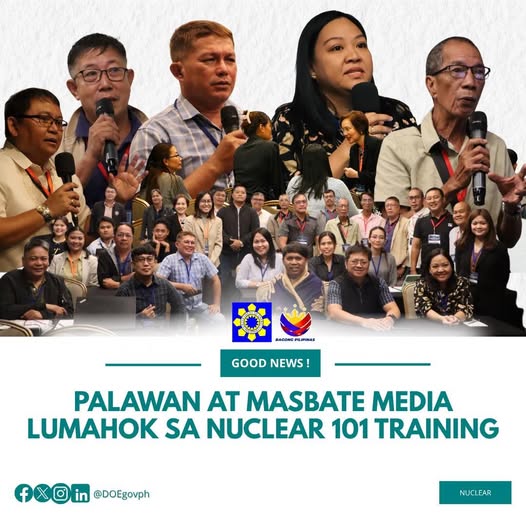The Nuclear Energy Program Inter-Agency Committee (NEP-IAC)'s Subcommittee 4 led by the Department of Energy (DOE) conducted the first round of its Nuclear 101 Training Series attended by local media practitioners from Palawan and Masbate from 23-26 June 2025.
The training kicked off with a whole-day information sharing at Somerset Millennium in Makati City that included the history and basics of nuclear energy tackled by National Power Corporation Officer-in-Charge Vice President Atty. Manuel Luis Plofino; overview of the Nuclear Energy Program (NEP) explained in a video presentation by NEP-IAC Technical Secretariat Head DOE Director Patrick T. Aquino; an overview of the draft NEP communication plan by the DOE Public Affairs Office team; the key criteria and standards in siting a nuclear power plant by Philippine Institute of Volcanology and Seismology Associate Scientist Dr. Arturo S. Daag; and nuclear safety, security and safeguards by Philippine Nuclear Research Institute Senior Science Research Specialist Mary Gold Bulos.
In her welcome remarks, DOE Nuclear Energy Division OIC Chief Shiela dela Cruz highlighted the need to inform, involve and engage with stakeholders whose concerns and feedback are crucial in the country's bid to embark on NEP, guided by the highest standards of the International Atomic Energy Agency (IAEA).
Meanwhile, Atty. Plofino cited the need to "know the facts and dispel the myths about nuclear energy to enable stakeholders to make an informed decision about the country's NEP" following extensive discussions on nuclear energy history and recent developments.
Aside from asking the toughest questions, participants from the media were also given the opportunity to join an exposure visit to the Bataan Nuclear Power Plant located in Morong, Bataan on 25 June 2025 to give them a clearer perspective on the processes and systems involved in tapping the energy source.
NEP-IAC created six subcommittees to address the 19 infrastructure issues identified by the IAEA soon after it was constituted under Executive Order 116. Meanwhile, subcommittee 4 is particularly in charge of the issues of stakeholder involvement, human resource development, and industrial involvement.
Last December, the IAEA sent a mission to the Philippines for a followup Integrated Nuclear Infrastructure Review (INIR) to check on the country's progress in developing the necessary infrastructure to embark on a nuclear power program.
In the 2018 INIR, the IAEA issued 14 recommendations and 13 suggestions that involved passing a comprehensive nuclear law, clarifying a national position, enhancing regulatory independence, among others.
In December 2024 follow-up INIR, the IAEA confirmed that nine of the recommendations have been fully addressed and that five were still in progress.
Recently, Congress ratified the Bicameral Conference Committee Report on Senate Bill No. 2899 and House Bill No. 9293 or the Philippine National Nuclear Energy Safety Act, which establishes the Philippine Atomic Energy Regulatory Authority or PhilATOM, calling it a milestone toward the safe, secure, and peaceful development of nuclear energy in the country. xxx

